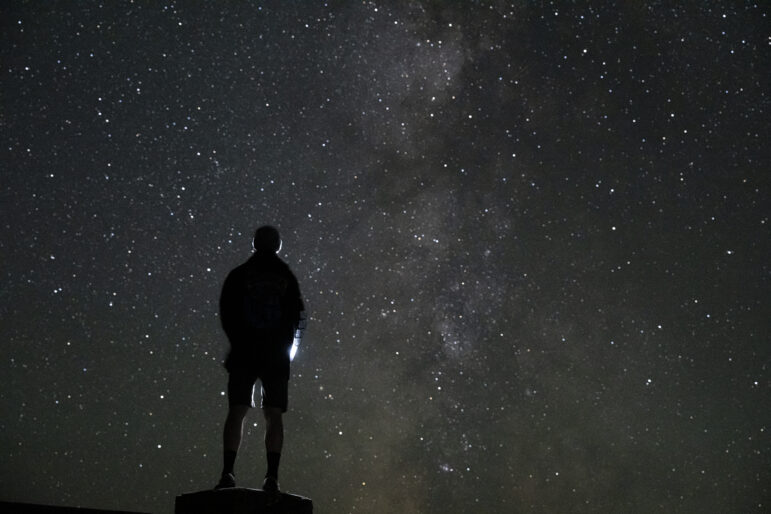
Visit Keweenaw
The night sky on March 15 as photographed at the Keweenaw Mountain Lodge.By MORGAN WOMACK
Capital News Service
LANSING – Packed with telescopes and a gadget to measure sky darkness, Minnesota’s “Astro Bob” King is heading to Michigan to commune with fellow night owls and sky enjoyers.
They’re coming for the Upper Peninsula’s first dark sky festival, running from April 21-22. It aligns with International Dark Sky Week, a week dedicated to raising awareness about light pollution.
King regularly shares stargazing tips in the Duluth News Tribune and the Sky and Telescope Magazine. He also teaches a public astronomy class at the University of Minnesota Duluth.
“I get so much joy out of the night sky at so many different levels,” King said. “I’d like other people to at least have a taste of that.”
He’ll be leading 50 visitors on a hike to see dazzling stars at the Keweenaw Dark Sky Park, a private 550-acre area around the Keweenaw Mountain Lodge, on Earth Day weekend. The visitors will stay at the lodge, take an aurora photography workshop and learn about sky preservation.
The lodge partnered with tourist information center Visit Keweenaw to plan the weekend. The event sold out a month in advance, said Visit Keweenaw events coordinator Jesse Wiederhold.
“I’m actually going to (the event) myself, and I cannot believe the cool people that were interested in talking about this,” Wiederhold said. “We put a lot of effort into doing this and the turnout is incredible.”
Organizers hope it builds momentum. The park hopes to get more community organizations like astronomy clubs involved, said the lodge’s chief lead John Mueller.
While 50 participants may seem small, the team will evaluate size and adjust next year.
“People come up here for getting closer to the wilderness and getting closer to the quietness and getting closer to the darkness,” Mueller said.
Speakers will teach workshops on tracking and photographing the Northern Lights. Visitors will even stargaze on snowshoes.
Last June, the Keweenaw park was awarded an international designation after park staff submitted an 150-page application and adjusted its lighting and regulations.
The lodge’s outdoor activity lead Chris Guibert said they decided to name the park vaguely, “Keweenaw Dark Sky Park,” so that if nearby areas wish to receive the designation, the park can be expanded.
Dark sky parks restrict light pollution to allow visitors to see the night sky more clearly. The International Dark-Sky Association designates them.
Michigan has two others designated by the association: Headlands Dark Sky Park in Emmet County and Dr. T.K. Lawless Park in Cass County.
The state also has designated six dark sky preserves: Lake Hudson Recreation Area in Lenawee County, Negwegon State Park in Alcona County, Port Crescent State Park in Huron County, Rockport Recreation Area and Thompson’s Harbor in Presque Isle County and Wilderness State Park in Emmet County.
King said dark sky parks serve as education centers. As a teacher himself, he said education and preservation go hand in hand.
“What you really want is so many people to be educated that they change the lighting in their own neighborhoods and in their own cities so they don’t have to drive to dark sky parks anymore,” King said.
King encourages people to buy shielded lampshades to avoid spilling light, close their shades and turn off outdoor lights at night.
“I can’t imagine cutting that gigantic chunk of universe off and restricting everything to just this one tiny planet,” King said. “There’s just so much out there to enjoy, to reflect on, to provide perspective, relief and relaxation, so many things the night can give us when we let it come in.”
While light pollution can impact humans’ ability to connect with the night sky, King said there are also adverse environmental effects. Insects, birds and other animals can be impacted.
Insects are attracted to lights with shorter wavelengths, like LED lights, said Lizz Parkinson, who is a National Science Foundation Fellow at the Oakland University.
Parkinson, who studies the impact of light pollution in aquatic ecosystems on insects like mayflies or fish flies, said the whole ecosystem can be disrupted when these insects are steered toward artificial lights because it can affect the food chain.
People can help avoid this ecological issue and reduce the light around their homes by setting lights to a timer and using motion-activated lights, she said.
Parkinson said starting any conversation about preserving the night sky is important.
“As humans, we’ve become so desensitized to artificial light at night and how everything is lit up that I don’t think it’s something that people think about as a genuine problem,” Parkinson said. “Education through dark sky parks is super important.”